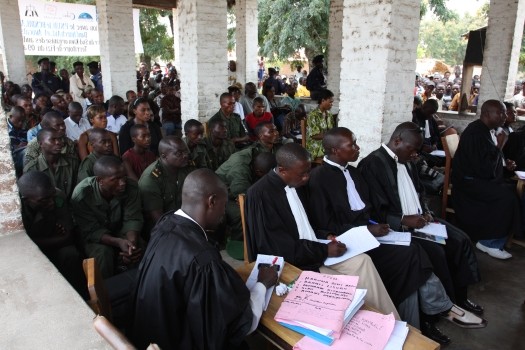KINSHASA, November 12, 2014 — The International Center for Transitional Justice (ICTJ), in cooperation with the United Nations Joint Human Rights Office (UNJHRO) and the United Nations Development Programme (UNDP), organized a high-level conference in Kinshasa today to discuss ways to strengthen the Congolese judicial system and its ability to investigate and prosecute serious crimes, such as genocide, war crimes, and crimes against humanity.
This conference is part of an ongoing project, funded by the European Union (EU), aimed at advancing the national judicial response to serious crimes in the DRC.
High-level representatives of the government, judiciary, resident embassies, donors and development agencies discussed progress made in the DRC to pass relevant legislation and improve the judicial response to continuing violations against civilians in the eastern part of the country.
“The number of open investigations related to international crimes remains very limited compared with the magnitude of the atrocities committed. The recent verdict against General Jerome Kakwaku is a positive sign, but more needs to be done,” said David Tolbert, President of ICTJ. “The opportunity to discuss current obstacles to carrying out an effective domestic response to these crimes is critical.”
The promise of justice and accountability for thousands of victims was brought forward in 2013 with the signing of the Peace, Security and Cooperation Framework. Though all of the countries in the region engaged in the process, little has changed in the Congolese judicial landscape.
The Congolese parliament has yet to adopt laws on the establishment of specialized chambers with jurisdiction over serious crimes, or on the implementation of the Rome Statute of the International Criminal Court.
Reflecting on the progress and shortcomings of recent legislative and judicial developments and the impact of international support for the Congolese courts, participants issued a set of actionable recommendations for Congolese authorities and international partners.
Among the recommendations is the importance of providing support and guidance to accelerate the adoption of key legislation in the fight against impunity and provide more efficient technical support to the judicial sector.
Concerns were also raised that recent engagements taken by the Congolese Armed Forces regarding the crimes of child recruitment and sexual violence must be extended to accountability for the pillaging of natural resources.
“Our hope is that these recommendations will inform efforts by Congolese authorities to provide justice to victims,” remarked UNJHRO.
Contact
Myriam Raymond-Jetté, Criminal Justice Program Officer, ICTJ E-mail: mraymond-jette@ictj.org
*Photo: DRC Mobile Court, Fizi crimes against humanity trial, 2011. (OSISA/Flickr)
